REPRESENTING AG, CONSTRUCTION AND OUTDOOR POWER EQUIPMENT DEALERS ACROSS IOWA AND NEBRASKA

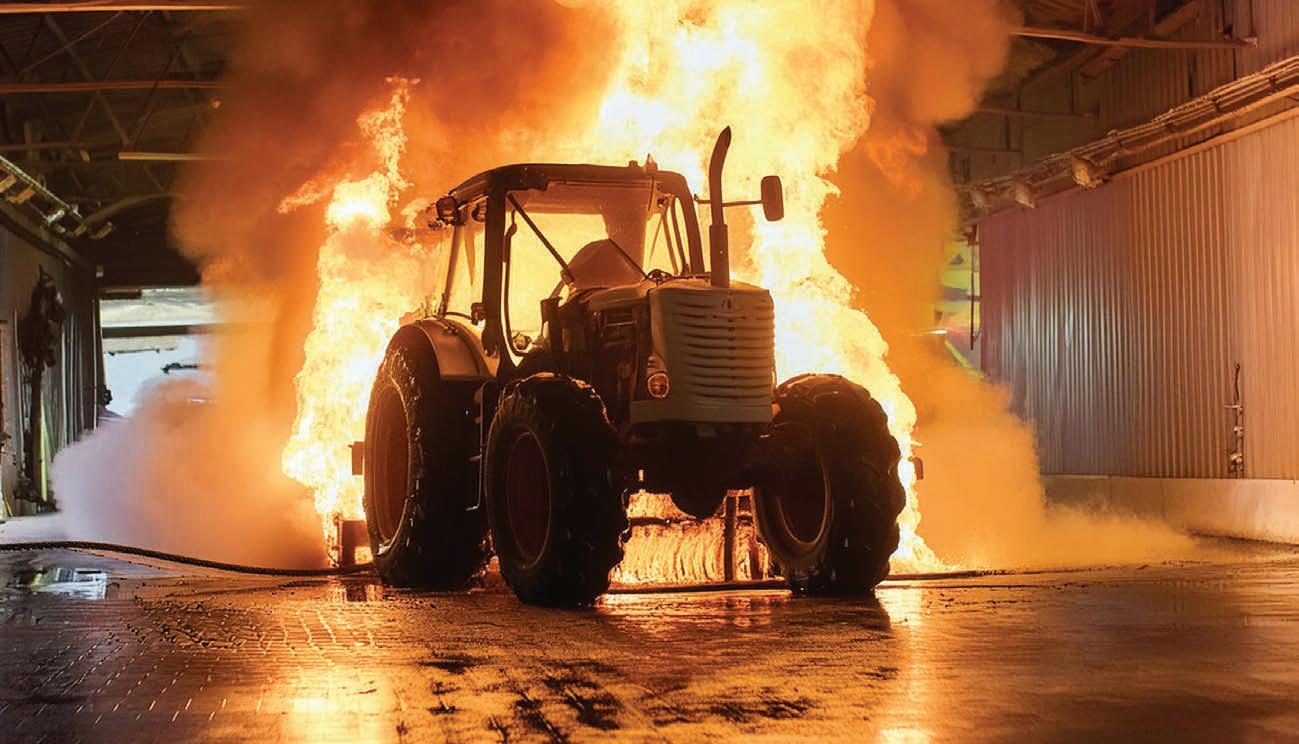

REPRESENTING AG, CONSTRUCTION AND OUTDOOR POWER EQUIPMENT DEALERS ACROSS IOWA AND NEBRASKA


Most fires are preventable. A single spark can turn years of hard work into a devastating loss. Federated® has observed an alarming rate of preventable fires. Investigation of these fire losses revealed that 96% could have been avoided with consistent focus on specific hazards and exposures.1
1 Federated
data: 2019, 2020, 2021, 2022.
This publication is intended to provide general information and recommendations for risk prevention only. The recommendations herein may help reduce the risk of loss but is not a guarantee of the elimination of any risk of loss. This is not provided as a substitute for any regulatory standards that may apply, nor should it be considered legal or other expert advice regarding your unique needs. Qualified counsel should be sought regarding questions specific to your circumstances.

■ Remove ignitable debris such as dried vegetation from equipment.
■ If equipment was washed, safely disconnect the battery.
■ Ensure the equipment is dry before connecting the battery.
■ If possible, move equipment outdoors after washing.
■ Use kill-switches on equipment.
■ Blow off excess water after washing to help accelerate drying.
■ Place damaged batteries in a fire-resistant container in an area away from combustibles and contact a battery recycling center for disposal instructions.
Federated is committed to helping clients develop loss prevention strategies, prepare training sessions, and support your organization’s risk management efforts. For assistance or more information, contact the Risk Management Resource Center at 1-888-333-4949.

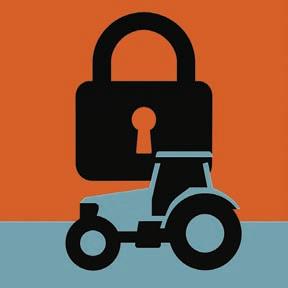
Read on as Director of Marketing, Cindy Feldman, shares how to manage the risks and opportunites of data management in marketing.
To eliminate ten existing regulations for every new rule has taken more than 60 deregulatory actions to cut regulatory burdens, spur job creation, and fuel economic opportunities
Kevin Clark Chairman, Lincoln, NE
Dave McCarthy Vice Chairman, Waterloo, NE
Jay Funke Past Chairman, Edgewood, IA
Bruce Bowman Ankeny, IA
Kent Grosshans Central City, NE
Keith Kreps Scottsbluff, NE
Mark Placek Alliance, NE
David Adelman IA Legislative Director
Phil Erdman Dir. of Dealer & Gov’t Rel.
Cindy Feldman Marketing Director
Laurie Haeder Ag Expo Coordinator
Mark Hennessey President/CEO
Tom Junge Sr. Expo Director
Andy Tank Expo Director
Tim Keigher NE Legislative Director
Cara Jicinsky Administrative Assistant
Jamie Mertz Dir. of Dealer & Gov’t Rel.
Gwen Parks Finance Director































































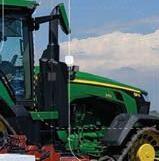












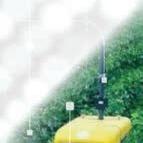



DECEMBER 9-11, 2025



















Individual subscriptions are available without charge to Association members. One-year subscriptions are available to all others for $30.00 (4 issues). Contact INEDA for additional information. This publication is designed to provide accurate and authoritative information in regard to the subject matter covered. It is furnished with the understanding that the Iowa-Nebraska Equipment Dealers Association, the publisher, is not engaged in rendering legal, accounting, or other professional services. Changes in the law may render the information contained in this publication invalid. Legal advice or other expert assistance should be obtained from a competent professional.
Ag Data, Data Privacy, and the Future Role for Producers and Equipment Dealers
In agriculture today, data has become just as vital a resource in producers’ operations as their equipment. Every pass of a planter, sprayer, or combine generates valuable information—yield maps, soil conditions, machine performance, and operator behavior. When harnessed effectively, this data can unlock new levels of efficiency, reduce input costs, and create more sustainable farming operations. Yet, the question of who owns, controls, and benefits from that data remains one of the most pressing issues facing producers and equipment dealers alike.
The Promise of Ag Data
For producers, data promises precision—tailored recommendations that improve yields and protect margins. For equipment dealers, it provides opportunities to deliver new value-added services, from predictive maintenance to customized agronomic insights. In both cases, the ability to turn raw data into actionable intelligence is shaping competitive advantage across the industry. One clear example is solutions-as-a-service, such as John Deere’s See & Spray™ technology. Using advanced cameras and machine learning, See & Spray identifies weeds in real time and applies herbicide only where needed. The result: less chemical usage, lower costs, and improved environmental sustainability. These benefits rely entirely on high-quality data captured, processed, and analyzed through equipment platforms.
The Privacy Challenge
However, with this promise comes a challenge: ensuring data privacy and trust. Producers are increasingly cautious about how their data is stored, shared, and monetized. Questions around whether manufacturers, technology providers, or third parties can access or profit from farm-level data without clear producer consent have raised concerns. Without trust, even the most advanced technology solutions face resistance.
The Role of Dealers as Trusted Partners
Equipment dealers stand at the intersection of technology and producer relationships. Dealers are uniquely positioned to play a stewardship role—helping producers understand data use agreements, ensuring transparency in how information flows, and advocating for farmer-first data practices. By prioritizing privacy and empowering producers to control their own information, dealers can strengthen trust while also positioning themselves as long-term strategic partners.


Chief Executive Officer
(continued)
The future of ag data will be defined not just by how much information can be collected, but by how responsibly it is managed. This introduces to the ag industry a concerted effort to focus on:
u Clear Standards for Ownership – Producers must retain control over their data and be able to decide how and when it is shared.
u Secure Storage Platforms – Robust protections against cyber threats are critical as more farm operations move online.
u Transparent Data Agreements – Plain-language contracts that outline what data is collected, who has access, and how it will be used.
u Dealer-Led Education – Dealers should serve as trusted advisors, bridging the gap between technology providers and producers.
Ag data is here to stay. The question is whether we handle it as a commodity to be exploited or as a shared asset that drives innovation while respecting the privacy and autonomy of those who create it. For producers and dealers, embracing this responsibility is not just good practice—it’s the foundation of the next era of agricultural growth.
Global to see the big picture.
Local to understand it.

Providing clarity. Building confidence.


PHIL ERDMAN Director of Dealer and Government Relations
[phile@ineda.com]
This summer we held district meetings across Iowa and Nebraska in the month of July. Typically, they have been held around the month of April, but we felt that July would be a better month for our members being April is so close to planting season or there are customers that are out in the field planting some years in early April.
In Iowa, the meetings were held during the week of July 14-17. The first meeting was at District 36 Wine & Bar in Ankeny, second night was at Blackstone in Iowa City, the third night was held at Mario’s Italian Restaurant & Lounge in Dubuque, and the last night was at Emerald’s in Algona. There were a total of 48 members and sponsors that attended the meetings, with two out of the four nights showing strong attendance. We had some good conversations with our members that attended with three main topics discussed this year.
The topics of conversation were warranty reimbursement, data privacy/protection, and transfer of ownership. We also discussed the legislative landscape in Iowa moving forward for 2026 with Governor Reynolds announcing that she would not be running again in 2026 for governor, it has opened a lot of competition for that role and other leadership roles throughout Iowa Senate and House and the federal House with Randy Feenstra throwing his hat in the ring for IA Governor.
The Carbon Capture Pipeline Eminent Domain Bill that was passed in the House and the Senate and then vetoed by the governor has caused much turmoil in the Republican party here in Iowa, making 2026 a difficult year to get much if any legislation passed.
For 2026, the Iowa district meetings will be held mid-August due to scheduling conflicts the same week as this year.

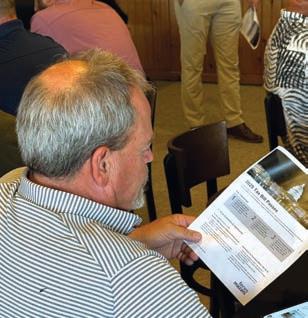

In Nebraska, the meetings were held during the week of July 21-24. All meetings in Nebraska were well attended with 77 people attending one of the four locations across the state – Alliance, North Platte, Grand Island and Fremont. In addition to the 55 dealers’ staff representing 20 dealer members, we also heard from State Senator Paul Strommen in Alliance and Sherry Vinton, Nebraska Director of Agriculture in North Platte.
Staff provided an update on legislation and issues that affect members that originated from the Legislature or by the Initiative process and what INEDA members have done to impact and improve or stop legislation that was harmful to dealers. There are 24 State Senators and the Governor and all Constitutional Officers up for election next year.
Staff and partners from Forvis Mazars provided an update on the One, Big, Beautiful, Bill and the impact it will have on the economy and ways that dealers should be prepared to adjust to new tax law passed by Congress. Congressman Bacon has announced he is not seeking election in Congressional District 2. Congressman Flood and Smith will be seeking reelection as will Senator Ricketts.
Members continued the conversation on various issues that are occurring within the business of running a dealership and any ideas or legislation that may impact or even improve their business. Specifically, members discussed warranty reimbursement, data privacy/protection, and transfer of ownership.
For 2026, the Nebraska District Meetings will be held in July next year.
All meetings were free to members to attend thanks to the sponsorship of AgDirect, Federated Insurance, Forvis Mazars, and Tax Favored Benefits.
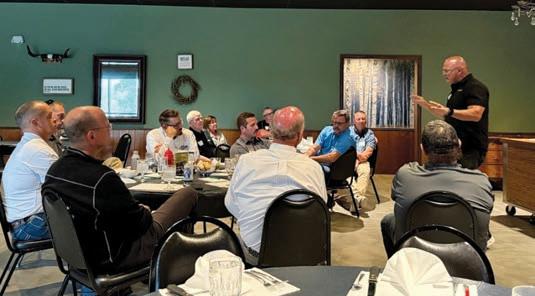

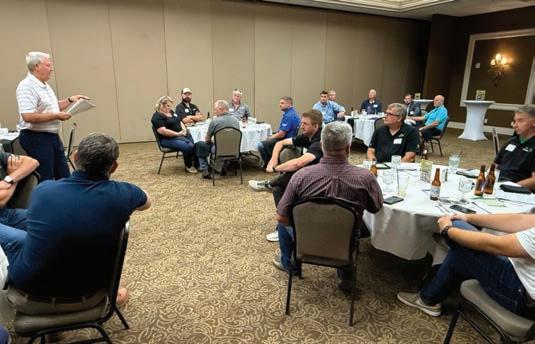



GOVERNMENT AFFAIRS
JAMIE MERTZ Director of Dealer and Government Relations [jamiem@ineda.com]
At some point, all our members will deal with the transfer of ownership or transfer of stock, regardless of the organization’s size.
In both Iowa and Nebraska, there is a state law that outlines the process to transfer ownership/stock to the buying individual or entity.
This process involves the manufacturer or manufacturers, as the new contract must be approved to represent those brands with the new owner or ownership group. Below are the laws for both states concerning the transfer of ownership for all Agriculture, Construction, and Outdoor Power dealers, and the process.
1. If a supplier has contractual authority to approve or deny a request for a sale or transfer of a dealer’s business or an equity ownership interest in the business, the supplier shall approve or deny the request within sixty days after receiving a written request from the dealer. If the supplier has not approved or denied the request within the sixty-day period, the request shall be deemed approved. The dealer’s request shall include reasonable financial information, personal background information, character references, and work histories for each acquiring person.
2. If a supplier denies a request made pursuant to this section, the supplier shall provide the dealer with a written notice of the denial that states the reasons for the denial. A supplier may only deny a request based on the failure of a proposed transferee to meet the reasonable requirements consistently imposed by the supplier in determining whether to approve a transfer or a new dealership.
(1) A supplier shall be deemed to have good cause to terminate, cancel, or not renew a dealer agreement when a dealer:
(a) Has transferred a controlling interest in the dealership without the supplier’s consent;
(3) If a supplier has contractual authority to approve or deny a request for a sale or transfer of a dealership or an equity ownership interest in a dealership, the supplier shall not unreasonably deny such request. The dealer’s request shall be sent by certified mail and shall include reasonable financial information, personal background information, character references, and work histories for each acquiring person. The approval or denial of a request made pursuant to this subsection shall be made in writing and sent by certified mail within sixty days after receipt of the request. If the supplier has not approved or denied the request within the sixty-day period, the request is deemed approved. If a supplier denies a request made pursuant to this subsection, the supplier shall provide the dealer with a written notice of such denial that states the reasons for denial.
If you have any questions regarding transfer of ownership and the process to be followed in either state, please reach out to Phil Erdman (phile@ineda.com) or Jamie Mertz (jamiem@ineda.com) and we will help answer questions or give guidance to this process.
1. Prepare your business plan – Collect all required materials from the buyer, i.e. financial information, personal background, character references, work history - to meet the supplier’s approval standards
2. Submit a Certified Request in writing – Once you submit a request of your intentions to sell your dealership, the manufacturer has 60 days to respond.
3. Maintain Records – Document all correspondence. The supplier must reply in writing within 60 days — otherwise, the request is automatically approved. If denied, they must provide written reasons. Keep these records and contact INEDA for guidance if questions arise.

TOM JUNGE Sr. Expo Director [tomj@ineda.com]
The Association takes the protection of exhibitor and attendee data seriously. It has been a policy of not sharing the exhibitor or attendee lists to outside vendors or posting more than the company name in the show exhibitor list.
For many years, when exhibitors paid for their booth with credit cards, the credit card numbers were removed from booth contracts and emails. In 2024, electronic booth contracts were implemented to tighten security with payments being made through a secure portal.
Unfortunately, farm shows haven’t been immune to scammers going directly to exhibitors trying to sell products, collect personal data or even collect payments. Scammers typically monitor the exhibitor list of shows and begin contacting them.
Scammers contact the exhibitors saying that they need to secure their booth or they may lose it unless payment is made.
Scammers contact exhibitors trying to sell them an attendee list. Scammer may or may not provide a list of names. If they do, it is a random list of farmers. I even periodically get these emails from shows that I previously attended.
Scammers will contact exhibitors saying they have a block of rooms for the show, and they can book the rooms through them for a bigger discount.
Scammer will contact exhibitors trying to sell them an expanded listing or ads in the show program.
First, as mentioned prior, we only list the company name in the exhibitor list. Some shows provide full contact information which makes it easy for scammers to target them.
Second, the Association warns exhibitors about active scams. We also tell them that show communication will only come from show management (Laurie or myself). System generated emails will come from @nebraskaagexpo.com, @iowaagexpo.com or @ineda.com.
Third, we post partnering motels on show websites so exhibitors can book directly with them.
Fourth, we do NOT give out our attendee list. It is only used by Nebraska or Iowa Ag Expo management for show promotion.
It’s unfortunate that these scams are out there. Scammers continue to target exhibitors knowing that new companies attend and there is employee turnover within companies. We inform exhibitors that if they are ever in doubt about a phone call or email that’s representing one of our ag shows, do NOT supply any information, and contact us to verify the authenticity of the correspondence.


The Basics Still Win Cybersecurity sounds complicated, but here’s the truth: most incidents happen because of basics left undone.
u MFA (Multi-Factor Authentication): If there’s one thing you do, do this. Passwords get stolen every day. MFA stops that.
u Email Security: Almost every ransomware attack starts in an inbox. Strong filtering plus smart user awareness blocks most of it.
u Training & Awareness: People are the first line of defense. They either click or they don’t. Training tips the odds in your favor.
Dealerships don’t need a 200-page cybersecurity strategy. They need to get the fundamentals right, consistently.
Trust but Verify If you outsource IT, you’re not off the hook. The best providers will give you transparency and proof. The worst ones just say, “Don’t worry, we’ve got it.”
Here’s how you can tell which one you have:
u Do you see regular, plain-English reports of backups, updates, and security checks?
u Has your provider tested your backups, timed it, and shown you the results?
u Can they explain risks in business terms, not jargon?

If the answer is no, you’re gambling.
Transparency isn’t optional. It’s the only way to know if your investment is doing its job.

You don’t need to be an IT expert to protect your dealership. Ask five questions and you’ll know where you stand:
1. What would one day of downtime cost us? That number should guide every decision.
2. Do we have MFA everywhere?
Not some accounts. All of them.
3. Are backups tested regularly and how fast can we restore?
“We have backups” means nothing until you’ve proven it.
4. Can my IT provider show me proof, in plain language?
If not, they probably don’t have it.
5. Do our employees know how to spot a phishing email?
Awareness is prevention.
Answer those five honestly, and you’ll know whether you’re exposed or not.


Why Now
Farming is data-driven now. Dealers handle financing, precision ag data, connected equipment, and mountains of customer records. And the manufacturing/ag sectors are the #1 cyber targets globally.
Hackers don’t care how many stores you have. They care that you have valuable data and revenue at risk.
Losing that data isn’t just about money. It’s about trust. And once you lose customer trust, it doesn’t come back easily.
Closing Thought
Cybersecurity isn’t about fancy tech. It’s about keeping the doors open.
For dealerships, that means fewer buzzwords, more accountability. Cover the basics, demand proof from your provider, and never underestimate the cost of downtime.
Because when the lights go out, the sales stop. And no dealer can afford that.
Travis Barker is the founder and CEO of EZ IT Solutions, an IT and cybersecurity provider built to keep manufacturers running. With over 20 years in the industry, he’s seen firsthand how downtime bleeds revenue and how most IT providers miss the point by measuring tickets instead of throughput. Travis started EZ IT to change that. His team delivers CFO-ready answers in days, not months, so leaders can quantify risk, cut downtime, and get back to growth. Beyond IT, Travis is a builder at heart: of businesses, of teams, and of generational wealth for those around him.

As producers navigate high interest rates, lower trade-in values and rising equipment costs, leasing continues to be a strategic option for managing cash flow and equipment decisions.
“Leasing can be used to manage deteriorating used equipment values, especially when working through trade-ins with little or no equity,” says Chris Stout, AgDirect territory manager in Arizona and California. “It also helps manage rising equipment costs by allowing customers to pay for the ‘use’ of the equipment rather than taking on the risk of ownership.”
Other leasing benefits include reduced upfront costs compared to a loan, and predictable payments, which can be beneficial for cash flow and balance sheet management during periods of margin pressure.
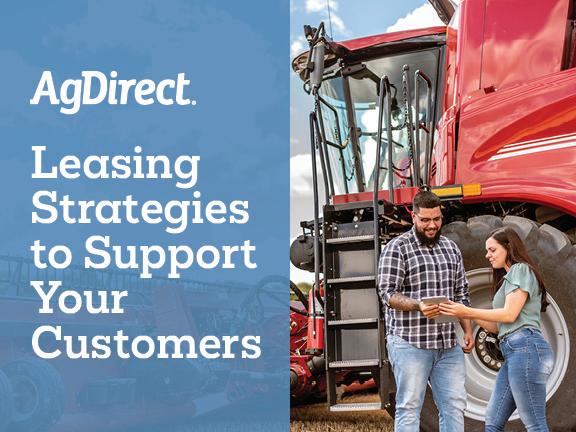
When helping customers evaluate whether to lease, take out a loan or pay with cash, Stout suggests asking a few key questions to ensure the financing option supports their operational and financial goals.
• How close are they to planting or harvest?
• Do they need to conserve cash heading into the season?
• Is it more cost-effective to buy the machine or pay for its use through a lease?
• Which option will keep the customer in warranty for the duration of use?
AgDirect, a leading equipment financing program offered by participating Farm Credit Associations, offers multiple lease types to help customers preserve working capital, manage cash flow and take advantage of potential tax benefits.
• Considered a true-tax lease
• Customer writes off lease payment, doesn’t depreciate asset
• Also known as a “Walk Away Lease”
• Customer has the option to purchase, trade or surrender (walk away) asset
Best Suited For: Customers who want the “use” of an asset rather than ownership and prefer to roll into new equipment at the end of the term instead of trading in.
• Considered a true-tax lease
• Customer writes off lease payment, doesn’t depreciate asset
• Customer has option to purchase, trade, or renew lease (no walk away option)
• Residuals are 5-10% higher than FPO lease
Best Suited For: Customers who are looking for lower payments than an FPO, and plan to purchase, refinance or renew at the end of the lease term. This lease type may also appeal to customers seeking similar tax advantages to an FPO.
• Considered a conditional sales lease
• Customer is obligated to purchase or trade asset (no walk away or renewal option)
• Customer takes depreciation on asset, doesn’t write off lease payment
• Residuals are 5-10% higher than FPO lease
Best Suited For: Customers who are looking for lower payments than an FPO, and plan to purchase, refinance or renew at the end of the lease term. This lease type may also appeal to customers who want to depreciate the asset on their balance sheet.
AgDirect also offers creative financing options, such as purchase leasebacks, to help customers recapture working capital.
“When a customer pays cash for machinery but later could use the capital required to buy the equipment, we can purchase it from the customer and lease it back to them with a purchase leaseback,” Stout explains. “It’s a great strategy for year-end planning that allows customers to spread out the need for capital and use it in their operations longer.”
Resources like the AgDirect leasing calculator along with expert support from territory managers and the internal sales team are available to help dealers and their customers evaluate their leasing options.
“With equipment pricing way up, leasing can be a smart strategy to help your customers lower their payments. At the same time, used equipment values are down, so if a customer has little or no trade equity, leasing may be a more attractive option than purchasing,” says Stout.
“Interest rates are still high compared to three to five years ago, and leasing can minimize interest expenses while giving customers full access to the equipment they need for only the hours they use it. And because leasing typically requires less cash upfront, it allows customers to preserve capital for other areas of their operation.”
Apply online, check rates, quote payments and compare options at agdirect.com or using the free AgDirect Mobile app available for download from the App Store and Google Play*. Or learn more about AgDirect equipment financing by locating the nearest AgDirect territory manager or contacting the AgDirect financing team at 888-525-9805.
*Your mobile carrier’s messaging data rates apply. The App Store is a service mark of Apple, Inc. Google Play is a trademark of Google, Inc.























CINDY FELDMAN, Marketing Director [cindyf@ineda.com]






























Agriculture is no longer just about tractors and combines—it’s about data. Dealers and their customers rely on connected systems, digital platforms, and operational technology to run efficiently. But with this connectivity comes risk. A single cyber incident at a dealership or cooperative can ripple through the entire supply chain, from farmer to manufacturer.
The FBI’s 2024 Internet Crime Report highlights the growing scale of cybercrime, with U.S. victims reporting $12.5 billion in losses. Agriculture is not immune:
• Ransomware: Six grain bin cooperatives in Nebraska and Iowa have already been attacked, forcing shutdowns and ransom demands.
• Business Email Compromise (BEC): Fraudulent wire transfers targeting ag businesses resulted in tens of millions in losses in Nebraska alone.
• Data theft and espionage: Foreign actors and criminal hackers target farm data, ownership records, and financial systems.
Dealers must understand that if they get hacked, the consequences extend beyond their own businesses— equipment distribution, service, and even food supply chains are impacted.





















Strong cybersecurity starts with disciplined, everyday practices:
• Harden systems: Use updated software, apply patches promptly, and enable multi-factor authentication (MFA).
• Protect customer data: Store critical data securely, offsite, with a recovery plan.
• Educate staff: Train employees to recognize phishing attempts and suspicious links.
• Plan for recovery: Develop and exercise an incident response plan before an attack occurs.
CISA provides free tools and services:
• Cyber Hygiene Scanning (request at vulnerability@cisa.dhs.gov).
• Stop Ransomware guidance to harden operational technology (OT) systems.
• Cybersecurity Performance Goals (CPGs) for baseline protections.

























Protect your business, employees, vendors, and customers by taking these steps today:



Many businesses are reluctant to call law enforcement, but time is critical. The FBI can:
• Help recover stolen funds in BEC cases if notified quickly.
• Provide tools and investigative support to contain attacks.
• Connect dealers to local cybersecurity resources.
Reporting is easy through IC3.gov, report@cisa. gov, or 1-844-SAY-CISA (1-844-729-2472). Don’t wait—speed can make the difference between recovery and loss.
• $12.5B – Total reported U.S. cybercrime losses in 2024 (FBI IC3).
• $49M – Estimated cyber losses in Nebraska from fraud, malware, and scams.
• 6 – Co-ops in Iowa and Nebraska hit with ransomware attacks in recent years.
• $9M – Ransom demand fr attack in the Midwest.
Takeaway for Dealers: Cybersecurity is no longer optional—it’s a core part of doing business. By implementing basic protections, leveraging CISA tools, and working with the FBI when incidents occur, equipment dealers can protect themselves and the entire agricultural supply chain.


Source: Eugene Kowel, FBI Omaha

1. 2. 3. 4.
Use Strong Passwords –Create complex, unique credentials for every account.
Turn on Multi-Factor Authentication –Add a second layer of defense to logins.
Recognize & Report Phishing –Train staff to spot suspicious emails.
Update Software – Apply security patches as soon as they’re released.





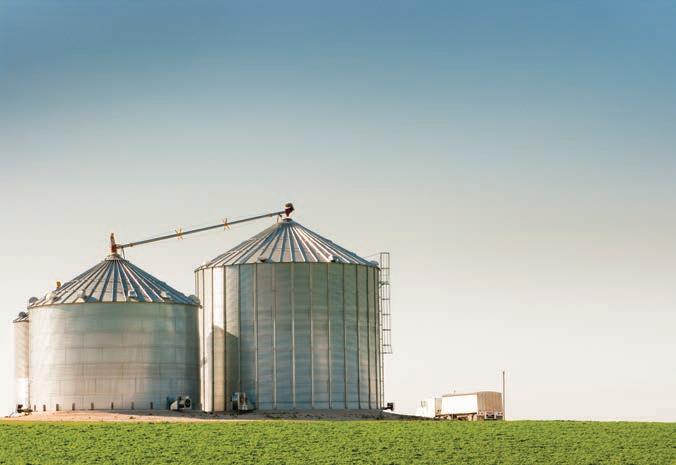




Today, as Agriculture 4.0 becomes a reality, nearly every process on the farm will likely generate data that informs not only the current growing season but also next year’s and the years to come. Farmers in previous generations made decisions based on touch and feel, or observations in the field, and did not rely on data like today’s modern farmers do.
Farm products are certainly the ultimate goal, as they are the goods that generate revenue for the farm. However, decisions based on data throughout the season drive today’s farm. Data-driven decision making leads to a shift in the farming paradigm: the contemporary farmer is farming data.
The likelihood that modern equipment replacing older models is smart or connected to the internet increases. This equipment and these devices essentially create a new virtual door to the farm, and must be secured. The systems likely require system access and data protection in ways that may be new to the farm operator.
Further, data and access to it become targets for online criminals targeting farms—especially via ransomware. Ransomware is when someone attacks your system and digitally locks access to it or your data. They will only restore access when you pay a ransom. Notably, this unlock process does not always work, and farmers may lose their ransom payment and data.

The loss of farm data, or access to it, and farm systems and equipment could severely impact a farm. Think about your farm’s operation and where you are using data and computer systems. Are there critical items that you would be unable to operate without? Would the loss of farm business records impact your ability to make timely tax payments? Do you rely on a digital system to monitor or control processes on the farm? Each of these may represent a cybersecurity need on your farm.
Therefore, the need for farmers to be aware of the risks and learn basic cybersecurity practices becomes increasingly important. Cybersecurity should encompass all farm systems, devices, and data, including protection from loss or corruption.
Furthermore, even if farmers have not fully adopted connected devices, they must understand they are at risk. Using a smartphone, computer, or email for day-to-day communications and business is still a digital component of the farm— even if you have not adopted more advanced technologies in your farm equipment and systems, analysis, or decision-making.


In 2022, the FBI warned agricultural cooperatives to be on high alert, as cyber threat actors were targeting their digital systems and could time the attacks to align with critical times of the farming season. In 2025, the threat continues to grow as cyber actors seek vulnerable segments of our nation’s critical infrastructure. Imagine how it would impact your farm if you could not acquire goods or services from your suppliers at a crucial point in the season.
So what can a farmer do to secure their systems and data?


First, inventory the digital systems and data on the farm to understand your risks and what needs to be protected.
• Do you have a computer or other digital device?
• Do you have a smartphone?
• Do you use email?
• Does your equipment have connections to the internet?
• Know where your data is stored, how access is maintained, and what systems may require updates.
Then, begin to learn the basics of cybersecurity. A wealth of information is available from the government and trade groups. Additionally, your local extension office, farm lender, or insurance company may be able to provide contacts or resources.
Some of the best practices include:
• Use strong passwords and don’t repeat them across multiple systems.
• Use multifactor authentication when offered.
• Update software and patch systems.
• Back up data, and store it in a safe location.
• Be aware of potential scams – email, phone calls, text messages.
• Search the internet for yourself and your business, see what information is out there, and take steps to protect yourself.
• Ask questions.
Additionally, explore the available free resources, such as:
- The Cybersecurity & Infrastructure Security Agency (CISA)
- CISA Cybersecurity Best Practices
- National Cybersecurity Alliance, Online Safety and Privacy
Source: Matthew J. Mitroka, Posted on August 18, 2025 | Posted in Data Management - Global Ag Tech Initiative

In July of 2025, the House Resolution 1 passed Congress (the “Act”). After various amendments and adjustments along the way, the final Act ended up including sweeping tax changes that affects individual taxpayers, businesses, nonprofits and more.
In July of 2025, the House Resolution 1 passed Congress (the “Act”). After various amendments and adjustments along the way, the final Act ended up including sweeping tax changes that affects individual taxpayers, businesses, nonprofits and more.
1
1
Tax Cuts and Jobs Act (TCJA) provisions are generally extended, made permanent, adjusted, or some combination thereof
Tax Cuts and Jobs Act (TCJA) provisions are generally extended, made permanent, adjusted, or some combination thereof
2
2 President Donald Trump proposed various tax changes during his 2024 presidential campaign, some of which are incorporated into the Act.
President Donald Trump proposed various tax changes during his 2024 presidential campaign, some of which are incorporated into the Act.
Business-related provisions include:
Business-related provisions include:
Section 199A Deduction Permanence/Enhancement
3
3
The Act’s passage was largely dependent on its “score ” To offset some of the cost, the Act includes certain “payfors” to decrease the Bill’s price tag.
The Act’s passage was largely dependent on its “score ” To offset some of the cost, the Act includes certain “payfors” to decrease the Bill’s price tag.
(BEAT, FDII, GILTI)
Section 199A Deduction Permanence/Enhancement
Section 199A deduction is made permanent at the 20% level.
Effective for taxable years beginning after December 31, 2025
Section 199A deduction is made permanent at the 20% level.
Effective for taxable years beginning after December 31, 2025
Applicable for flow-through entities, the permanency of the §199A deduction maintains the attractiveness of these entity types, which also can have the benefits of flexible agreements and avoidance of double taxation.
Applicable for flow-through entities, the permanency of the §199A deduction maintains the attractiveness of these entity types, which also can have the benefits of flexible agreements and avoidance of double taxation.
Made rate adjustments to BEAT, FDII, and GILTI
(BEAT, FDII, GILTI)
Other changes related to expense allocations and foreign tax credit calculations
Made rate adjustments to BEAT, FDII, and GILTI
Effective for taxable years beginning after December 31, 2025
Other changes related to expense allocations and foreign tax credit calculations
Effective for taxable years beginning after December 31, 2025
With uncertain and increased tariffs, there may be interplays with BEAT, FDII, and GILT that should be modeled with the new rates and permanence.
With uncertain and increased tariffs, there may be interplays with BEAT, FDII, and GILT that should be modeled with the new rates and permanence.

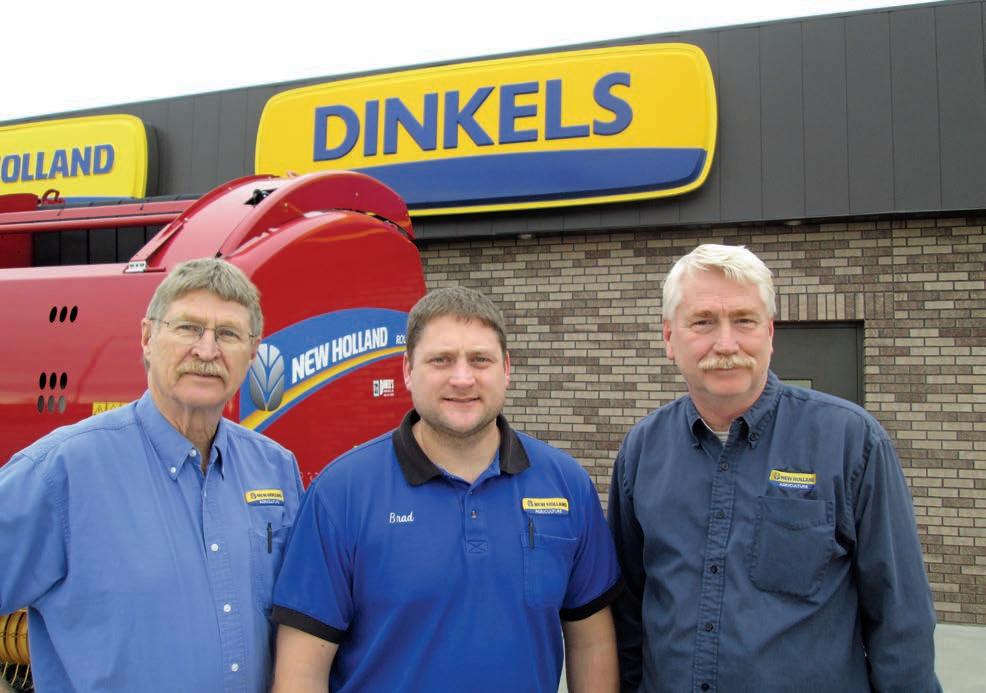
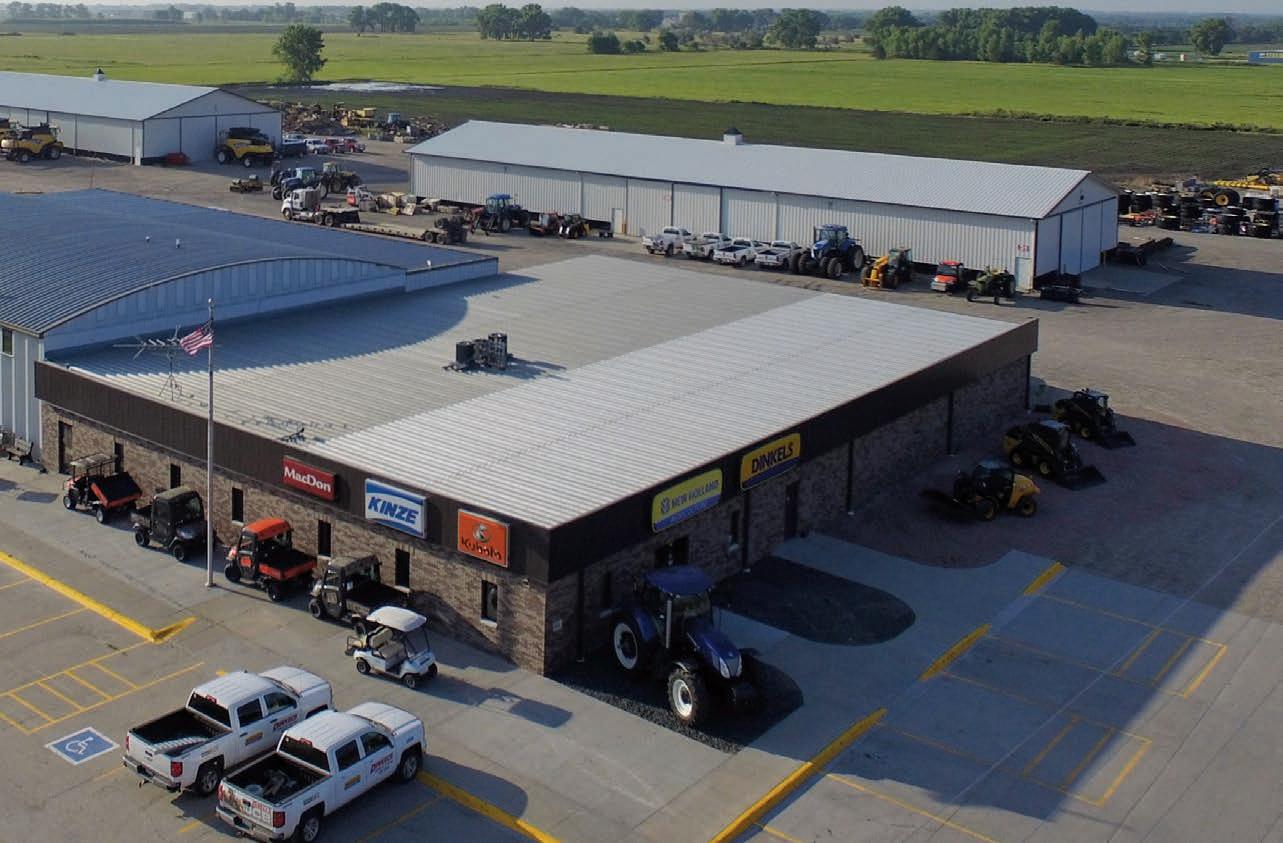


Q: How did your dealership get started, and what inspired you to get into the business?
Dinkel Implement was founded in 1952 by Leon Dinkel, who, despite his passion for raising purebred hogs, had to give up that dream due to allergies. He instead went to work for a local equipment dealer in Norfolk and soon struck out on his own, establishing the business. Over the decades, the dealership has remained a family affair, with each generation stepping in at critical moments. John started part-time at just 14, later joining full-time when their father passed. Larry recalls the move to the west edge of Norfolk as a turning point, giving the dealership more visibility and space. Brad, representing the third generation, joined full-time in 2008 after realizing he wanted to return to his roots and help grow the family business.
Q: What are the biggest changes you’ve seen in the equipment industry?
All three agree that consolidation has reshaped the industry—from fewer farmers and dealerships to larger manufacturers. Technology has also been a defining shift, with farmers embracing precision tools and equipment that demand new levels of support and service. Rising costs and the increasing size of equipment have only added to the complexity.
Q: How have customer expectations changed, and how has your dealership adapted?
While farmers have always wanted quick, reliable support, the way they expect it has changed. Today’s customers are more sophisticated, connected, and demanding, especially during harvest. The dealership has expanded sales and service departments, adapted to technology, and leaned heavily on great employees to deliver.
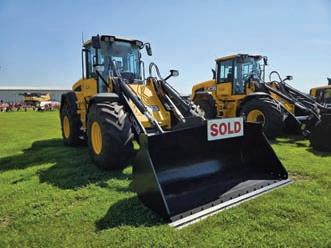
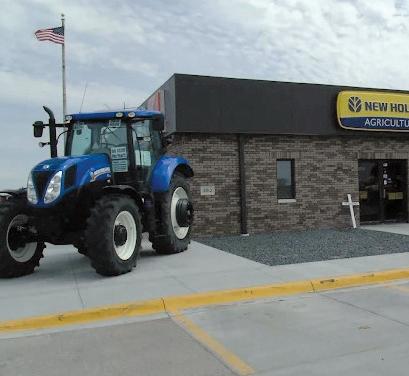
Q: What’s been your approach to navigating economic downturns or challenging seasons?
The Dinkels say success has come from focusing on customers while being smart with business operations. That means maintaining lean operations when needed, managing inventory carefully, and building strong relationships with local banks. Just as importantly, they’ve learned to be flexible—helping farmers refinance, extending equipment life where possible, and always prioritizing service.
Q: What’s the best business decision you’ve ever made?
From facility expansions to selecting the right equipment lines, the Dinkels agree that investing in the dealership’s infrastructure and people has paid off. Relocating to the west edge of Norfolk streamlined operations, while expansions to the shop and offices boosted efficiency. Adding new brands like JCB has also strengthened sales and service.
Be a partner, not just a company they buy from. “
Q: What advice would you give a new or younger dealer just starting out?
The advice is practical and hard-earned: hire top-notch employees, have enough capital to weather downturns, avoid over-leveraging, and seek advice from experienced people. Above all, surround yourself with quality people—both in employees and mentors.
Even though Farm Safety Week has passed, it’s a good reminder for all of us in agriculture to think carefully about how we approach safety during harvest. But the truth is, one week of reminders won’t cut it. Safety has to stick with us through the whole season, because the dangers don’t disappear once this week is over.
Harvest is one of the most exciting times of the year. After months of planning, planting, and watching the crop grow, we finally get to bring it in. But let’s not sugarcoat it—it’s also one of the most stressful times. Equipment is running sunup to sundown, trucks are on the road all hours of the day, and everyone is pushing to beat the weather. Long hours, tight schedules, and fatigue can turn even the smallest mistake into a serious accident.
Let’s start with the roads. We all know the sight—an impatient driver pulling around a combine or racing to beat a grain truck to the intersection. It’s frustrating and dangerous. And while you can’t control their choices, you can control your own visibility. That means checking those flashers before you leave the yard. Make sure your slow-moving vehicle signs are clean, bright, and easy to see. Flipping your lights on at dusk, not waiting until it’s pitch dark. Little details like that can buy other drivers the time they need to react.
Now think about the fields. Conditions change quickly this time of year. A washed-out spot, a soft edge near a ditch, a low-hanging powerline—those are hazards you can’t afford to ignore. Do you have a plan for how equipment moves in and out of the field? Do your cart drivers know where to wait so they aren’t crossing paths with trucks? Is everyone using the radio or phone to call out their moves so nobody’s guessing where the other guy is? Communication might feel like an extra step in the rush of harvest, but it prevents a lot of close calls.

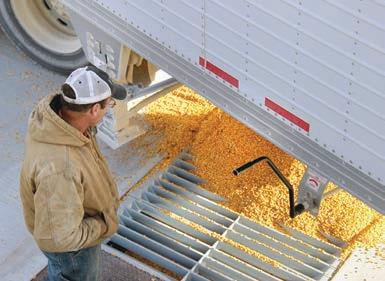

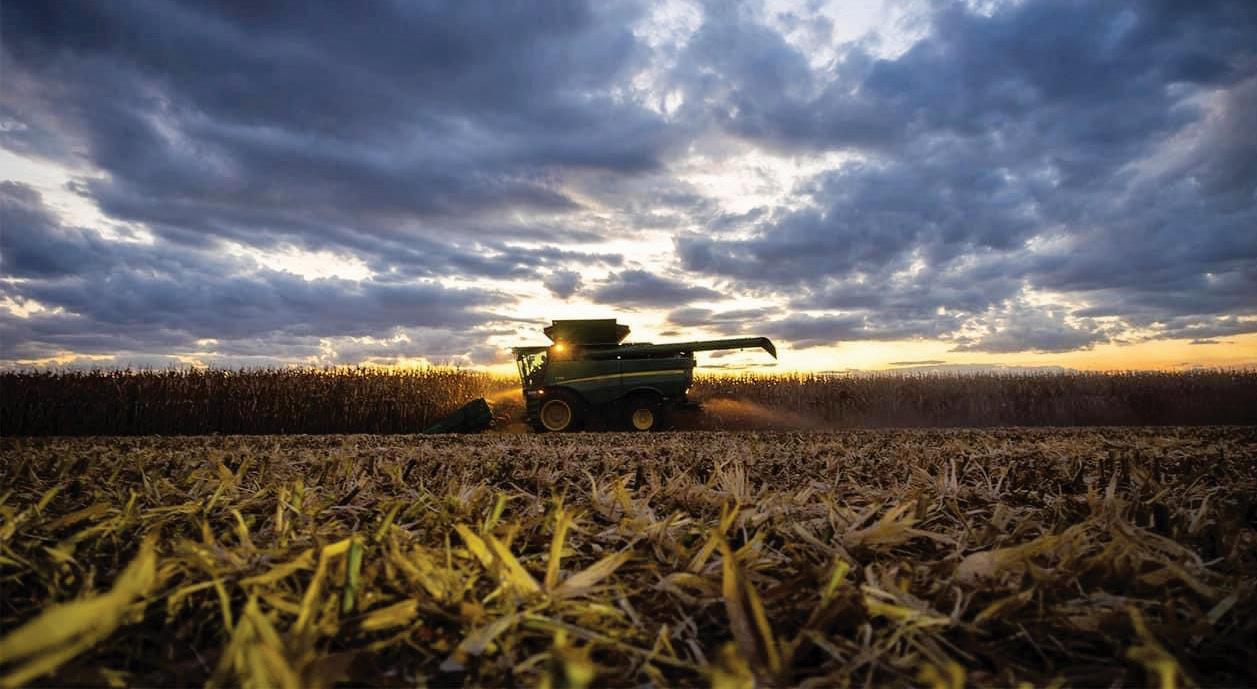
Then there’s the shop and the yard. Harvest puts a lot of wear and tear on machinery, and breakdowns are bound to happen. When they do, are you taking the extra time to shut things off, block things up, and make sure equipment is stable before you crawl underneath? A few extra minutes of caution can keep a repair from becoming a rescue.
And while we’re talking machinery, don’t forget about fire risk. Combines run hot, and when you mix in dry crops, dust, and wind, flames can spark fast. Are you taking time to blow machines off at night? Do you have a working extinguisher in the cab, and maybe even one on the service truck? Watching for smoke, checking bearings, and keeping things clean can mean the difference between a close call and a total loss.
And we can’t ignore the human side. Fatigue is one of the biggest dangers we face. After ten, twelve, or even fourteen-hour days, focus starts to slip. That’s when people cut corners. That’s when accidents happen. Sometimes the safest decision you’ll make all season is the one to stop for the night, get some food, and come back at it rested. The crop will wait.
We also need to think about the extra help that comes in this time of year. Neighbors, seasonal workers, or kids just getting off the school bus. They may not know all the ins and outs of the operation. A quick safety talk—where the fire extinguisher is, how to shut something down in an emergency, where not to stand when a truck is backing up—can save someone’s life.
At the end of the day, Farm Safety Week is a good reminder. But the truth is, safety isn’t about one week on the calendar. It’s about making the choice, every single day, to do things the right way. The crop will still be there tomorrow. The people waiting for you at home need you there tonight. And that’s the most important harvest of all.
Source: Dustin Hoffman, ag broadcaster – Iowa Agribusiness Radio Network

CINDY FELDMAN, Marketing Director [cindyf@ineda.com]
Today’s equipment dealerships rely on digital marketing to connect with customers, showcase inventory, and generate leads. But with that opportunity comes risk. Every email campaign, online form, or social media ad depends on the collection and management of customer data—and that makes dealerships a target. Cybercriminals are no longer just after large corporations; small and mid-sized businesses, including equipment dealers, are just as vulnerable. Protecting data is no longer an IT issue alone—it’s a marketing responsibility and a business imperative.
Protection Against Threats
Modern marketing relies heavily on customer data, making marketers prime targets for cybercriminals. Common threats include data breaches, phishing attacks, and ransomware. A single incident can bring operations to a standstill and permanently damage customer relationships.
Compliance and Regulations
Laws such as the General Data Protection Regulation (GDPR) in Europe and the California Consumer Privacy Act (CCPA) require businesses to obtain consent, manage data responsibly, and give users control of their personal information. Even if your dealership isn’t directly under these jurisdictions, customer expectations for transparency and security are universal. Non-compliance—or even the perception of negligence—can have financial and reputational consequences.
Building and Maintaining Customer Trust
In an age of heightened privacy awareness, customers expect brands to protect their information. Transparency and proactive cybersecurity practices can build long-term loyalty and strengthen your dealership’s reputation. Conversely, a single data breach can undo years of effort in establishing trust.
For equipment dealers, customer data is as valuable as the machinery on your lot. Protecting that data is safeguarding your dealership’s future.
• Practice data minimization: Collect only the data that’s essential to your marketing goals.
• Prioritize transparency and consent: Be clear about what you collect and how you use it. Tools like Consent Management Platforms (CMPs) help provide simple opt-in/opt-out options.
• Adopt “Privacy by Design”: Make security part of every campaign from the beginning, not an afterthought.
• Secure your systems: Use multi-factor authentication, strong passwords, encryption, and marketing platforms with robust protections.
• Educate your team: Train all marketing staff on cybersecurity threats and privacy best practices. Human error remains the leading cause of breaches.
• Vet third-party vendors: Ensure that any partners or platforms handling your dealership’s data follow strong security protocols.
• Break down silos: Aggregate data into a unified system to improve accuracy, consistency, and security.
• Audit and update regularly: Schedule ongoing security and privacy checks, update policies, and stay informed about new threats and regulations.

Train employees regularly to recognize phishing, data misuse, and common cybersecurity risks.
Use multi-factor authentication, strong passwords, and encryption to protect sensitive data.
1 2 3
Conduct regular reviews of data policies, vendor security practices, and compliance with regulations.
JERRY L. PIGSLEY WOODS AITKEN LLP
Lincoln, Nebraska

The U.S. Department of Labor (DOL) per the direction of President Trump to eliminate ten existing regulations for every new rule has taken more than 60 deregulatory actions to cut regulatory burdens, spur job creation, and fuel economic opportunities for American workers and businesses.
DOL has lowered the penalties for OSHA violations by providing a penalty reduction level of 70%, which was previously only applicable for businesses with ten or fewer employees, to now be expanded to include businesses who employ up to 25 employees. The new guidance provides a 15% penalty reduction for employers who immediately take steps to address or correct a hazard. The updated guidance provides for a 20% penalty reduction for employers who have never been inspected or employers who have been inspected in the previous five years and had no serious, willful, or failuretoabate violations.
DOL has ended the President Biden-era directive to DOL investigators to seek liquidated damages in the investigative stage under the Fair Labor Standards Act. DOL had not sought liquidated damages until 2010 under the Obama administration. In 2020, the Trump administration placed guardrails on this practice. In 2021, President Biden’s administration authorized the practice again and now President Trump has ended the Wage and Hour Division’s ability to seek such damages in administrative proceedings.
DOL has brought back the Payroll Audit Independent Determination (PAID) program. The program was initially launched during President Trump’s first term and discontinued by President Biden. The program is designed to quickly resolve compliance issues related to minimum wage and overtime and now has been expanded to include the Family and Medical Leave Act.
DOL has launched a new program, SALUTE: Support and Assistance for Leaders in USERRA Training and Employment to help employers proactively review their policies and practices under the Uniform Services Employment and Reemployment Rights Act.
DOL is once again providing official written opinions on the federal laws it enforces on wage and hour issues, workplace safety and health, workplace retirement and health benefits, and veteran and service member employment. The request must not be related to an existing matter that is under investigation by the DOL or in litigation with the DOL.
Several final rules issued by the DOL during President Biden’s administration have been rolled back by President Trump’s DOL or are in litigation. DOL has begun and continues down the path of deregulation and undertaking new rule making to restore rules from the prior Trump administration. INEDA members need to stay tuned for the different new rules impacting their employment law practices coming from Washington, D.C., and from the state lawmakers.
Editor’s Note: This article is not intended to provide legal advice to our readers. Rather, this article is intended to alert our readers to new and developing issues and to provide some common sense answers to complex legal questions. Readers are urged to consult their own legal counsel or the author of this article if the reader wishes to obtain a specific legal opinion regarding how these legal standards may apply to their particular circumstances. The author of this article, Jerry L. Pigsley, can be contacted at (402) 437-8500, jpigsley@woodsaitken.com, or at Woods Aitken LLP, 301 S. 13th Street, Suite 500, Lincoln, NE 68508-2578.
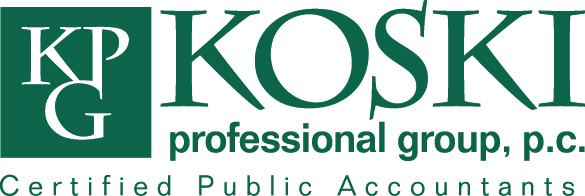
Providing
Sales/Acquisitions of Dealerships
Succession Planning
Strategic Planning
Financial Statements & Tax Returns







Iowa-Nebraska Equipment Dealers Association
8330 NW 54th Ave.
Johnston, IA 50131-2841











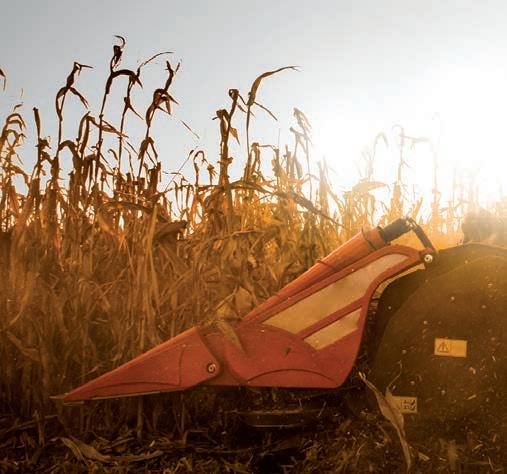





Equipment financing made easy.
Don’t lose momentum on your next sale. AgDirect ® makes it easy to offer fast, flexible solutions with competitive rates, loan and lease options, and longer terms, backed by a team that knows ag. With us in your corner, you can close more deals with confidence while giving your customers the financing experience they deserve. For more info call 888-525-9805 or visit agdirect.com.

Simple 10-minute application
Fast credit decisions As low as $0 down* Ag-friendly terms and competitive rates